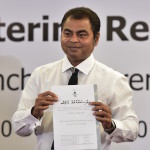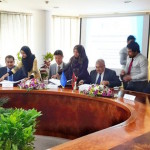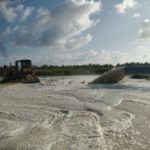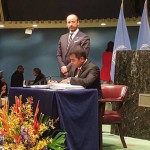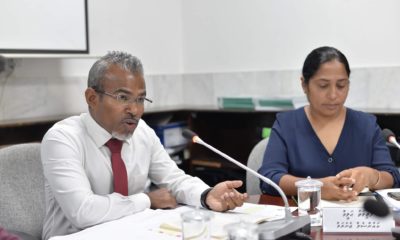The environment ministry on Thursday signed an agreement with a Chinese company to install 1.5 megawatts of solar photovoltaic systems in the capital’s suburb Hulhumalé.
The agreement was signed under the Accelerating Sustainable Private Investments in Renewable Energy (ASPIRE) project developed in collaboration with the World Bank, the environment ministry said.
“The principle of ASPIRE is to enable solar photovoltaic investments through a Power Purchasing Agreements (PPAs) lasting for 20 years, backed by the government and the World Bank guarantee facility, which covers payment delay risks and termination risks, on top of other assurances provided through the government and the World Bank,” the ministry explained.
The ministry said the investor, China Machinery Engineering Corporation (CMEC) in association with Grass Solartek Schweiz SA of Switzerland, was selected through an international competitive bidding process initiated in April.
In May, the tourism ministry had also signed an MoU with the state-owned CMEC company to develop a resort in Thaa atoll.
Under the first phase of the ASPIRE project, a second agreement was signed between CMEC and the State Electricity Company (STELCO) to purchase electricity from the 1.5 megawatt of solar panels.
With the “implementation agreement” signed with the environment ministry, the government is to provide support under the ASPIRE structure.
In a new action plan submitted ahead of crucial climate change negotiations in December, the current administration pledged to reduce greenhouse gas (GHG) emissions by 10 percent before 2030 by switching to renewable sources of energy.
The Maldives’ energy demand is almost completely met by imported fossil fuels with 30 percent of the country’s GDP spent on importing petroleum products.
Speaking at a signing ceremony held at the Hotel Jen in Malé, State Minister for Environment Abdul Matheen Mohamed said the government’s target is generating 30 percent of daily peak electricity demands in all uninhabited islands through solar PV technology.
Environment Minister Thoriq Ibrahim said the solar energy project is a significant milestone as it is the first sub-project under ASPIRE.
Thoriq said the successful implementation of the project “will also give confidence to potential future investors to accelerate the nationwide adoption of greener technologies in the Maldives,” according to the environment ministry.
The ministry noted that the ASPIRE project is part of a broader initiative called the Scaling-up of Renewable Energy Programme, which has been undertaken with funding from Climate Investment Funds, Asian Development Bank, Islamic Development Bank, European Investment Bank, World Bank and various other donors.
“This programme which is worth up to $200 aims to transform the energy sector through deploying 40MW of solar photovoltaic and other renewable energy technologies over the course of the next four years within the Maldives,” the ministry said.
Thoriq meanwhile said that 4 megawatts of solar panels have been installed in the Maldives so far, of which more than half was installed after President Abdulla Yameen took office in November 2013.
The current administration has faced criticism over its plans for oil exploration in Maldivian waters. In February, some 20 NGOs urged President Abdulla Yameen to reconsider the policy, saying the venture will risk the country’s economic and environmental health.
Local environmental groups opposed to the move say exploring for fossil fuels is hypocritical, as the Maldives is among the world’s most vulnerable countries to climate change impacts such as sea level rise, ocean acidification and extreme weather events.
In its Intended Nationally Determined Contribution (INDC) – submitted to the United Nations Framework Convention on Climate Change secretariat last month – the government said switching to alternative energy options is “severely constrained by the limited land area, geographic isolation of islands and geographic dispersion of populations.”
“Solar irradiance is available in the country throughout the year, however due to lack of technical capacity, limited land area, already established diesel based power generation systems and high investment costs pose a major challenge to the introduction of solar PV systems in the country,” the document explained.


